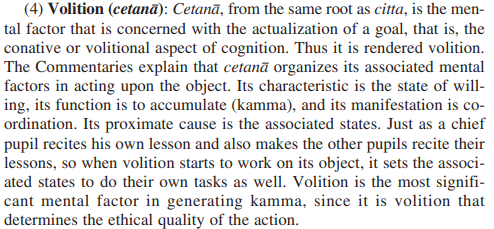Remember my answer about the attention/association process?
There I explained how our attention works under the hood as a cyclic association process with feedback. Remember, how the new associations either support or crowd out the current topic?
Cetana is exactly that in-the-moment "incline" in the cyclic association process, in some direction, that shifts it from one topic to another. It is the ability of the new topic to iteratively crowd out the old topic. In other words it is the relatively more attraction the new topic has over the old topic.
For example, if I open my pantry looking for plastic trash bags, and notice a bar of chocolate, then my thinking gets momentarily dominated by the memory of the sensation of chocolate dissolving in my mouth, and despite having an entirely different goal, I suddenly start getting pulled in the direction of taking a bite of the chocolate. That's Cetana. Subjectively I may think, "oh, why don't I take a little bite of that chocolate?" So in one sense you could say "I saw the chocolate and decided to have a piece". In the other sense, we can say it's the chocolate that has attracted you. It is not one or the other, these are just two different perspectives on the same thing.
This switch from trash bag to chocolate does not happen instantaneously. Instead, there's a shift from one to the other, over some short but not insignificant stretch of time. Perhaps a few seconds. You see the chocolate and feel the pull, and while your eyes are still searching for that trash bag, your hands are taking the chocolate bar and your mouth is biting it.
That shift or inclination in your attention is Cetana.
While Chanda is something entirely different. Chanda is when the child saw a puppet in the toy store, and having come home keeps asking mom to buy the puppet. And the mom says, "but what are you gonna do with it, after a day you will just throw it in the box". And the child says, "no I will do all kinds of things with it." -- "But what things?!" asks mom. -- "I don't know" - says the child, "but I want it".
This vague idea that "when I have it, it will be good" is Chanda.
So Cetana is just an ever present normal regular part of how our mind works moment by moment. Our attention always shifts, there's always an incline. While Chanda is a distinct type of ideation, it is thinking about something and endowing it with good qualities, in your imagination.
Perhaps we could translate Cetana as "impulse" and Chanda as "wishful thinking".


